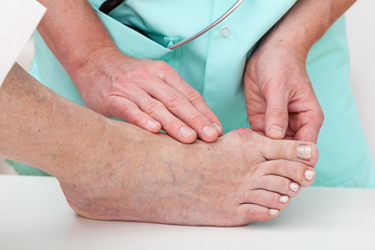 A large bony protrusion under the big toe is often referred to as a bunion. It often appears
A large bony protrusion under the big toe is often referred to as a bunion. It often appears
red and swollen, which may result in difficulty in buying footwear. Choosing high heels that are worn most of the day is a possible cause of painful bunions because of the pressure the toes incur. The outdoor temperature may be a factor in determining what type of shoes are worn. People who live in warmer climates are more likely to wear shoes with open toes, frequently preventing bunions from developing. Possible ways to prevent this condition is to eliminate wearing shoes with pointed toes and high heels on a regular basis. If a bunion does start to form, you may notice discomfort and pain at the bottom of the big toe, and the use of a foot splint may be an option for treatment as soon as it is noticed. Surgery may be necessary if prolonged discomfort is felt and the bunion exacerbates. If you are experiencing symptoms of a bunion, contact a podiatrist to discuss treatment options.
If you are suffering from bunions, contact one of our podiatrists of Active Foot and Ankle Care, LLC. Our doctors can provide the care you need to keep you pain-free and on your feet.
What Is a Bunion?
A bunion is formed of swollen tissue or an enlargement of boney growth, usually located at the base joint of the toe that connects to the foot. The swelling occurs due to the bones in the big toe shifting inward, which impacts the other toes of the foot. This causes the area around the base of the big toe to become inflamed and painful.
Why Do Bunions Form?
Genetics – Susceptibility to bunions are often hereditary
Stress on the feet – Poorly fitted and uncomfortable footwear that places stress on feet, such as heels, can worsen existing bunions
How Are Bunions Diagnosed?
Doctors often perform two tests – blood tests and x-rays – when trying to diagnose bunions, especially in the early stages of development. Blood tests help determine if the foot pain is being caused by something else, such as arthritis, while x-rays provide a clear picture of your bone structure to your doctor.
How Are Bunions Treated?
- Refrain from wearing heels or similar shoes that cause discomfort
- Select wider shoes that can provide more comfort and reduce pain
- Anti-inflammatory and pain management drugs
- Orthotics or foot inserts
- Surgery
If you have any questions, please feel free to contact our offices located in Fair Lawn, Riverdale, and Englewood, NJ . We offer the newest diagnostic and treatment technologies for all your foot care needs.
Read more about Bunions





